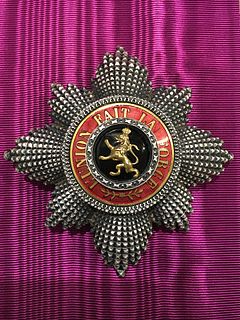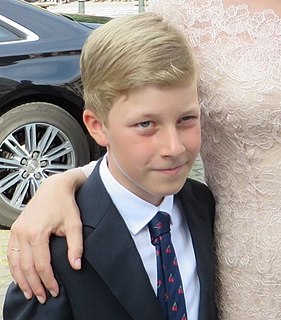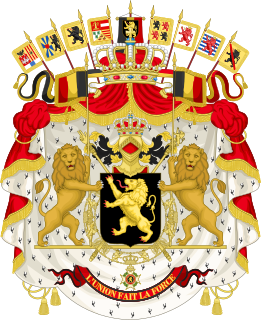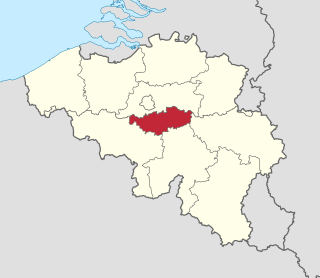
The Order of Leopold is one of the three current Belgian national honorary orders of knighthood. It is the oldest and highest order of Belgium and is named in honour of its founder; King Leopold I. It consists of a military, a maritime and a civil division. The maritime division is only awarded to personnel of the merchant navy, and the military division to military personnel. The decoration was established on 11 July 1832 and is awarded by Royal order.

The Belgian official journal is the official journal of the Kingdom of Belgium. It is where the official publication of laws, royal decrees, decrees, ordinances, and official notices are published. The publication is handled by the Federal Public Service Justice.

Prince Gabriel of Belgium is the elder son and second child of King Philippe and Queen Mathilde of Belgium. He is currently second in line to the throne of Belgium after his elder sister, Elisabeth.

Prince Emmanuel of Belgium is the younger son and third child of King Philippe and Queen Mathilde of Belgium. He is currently third in line to the throne of Belgium after his elder sister, Princess Elisabeth, and brother, Prince Gabriel.

Belgian nationality law provides for the conditions in which a person holds Belgian nationality and is based on a mixture of the principles of jus sanguinis and jus soli.

Council of State, is the supreme administrative court of Belgium. Its functions include assisting the executive with legal advice and being the supreme court for administrative justice. Its members are high level jurists.

Princess Eléonore of Belgium is the younger daughter and the youngest of four children of King Philippe and Queen Mathilde of Belgium. She is currently fourth in line to the throne of Belgium after her older siblings Princess Elisabeth, Duchess of Brabant, Prince Gabriel, and Prince Emmanuel.
The Royal Netherlands Chemical Society is a learned society and professional association founded in 1903 to represent the interests of chemists and chemical engineers in the Netherlands. Currently the organisation has approximately 7,400 members.
Franz Thomas Bruss is Emeritus Professor of Mathematics at the Université Libre de Bruxelles, where he had been director of "Mathématiques Générales" and co-director of the probability chair, and where he continues his research as invited professor. His main research activities in mathematics are in the field of probability:
The Human Rights League was founded in Belgium on 8 May 1901, after the in 1898 established Ligue des Droits de l'Homme in France. The Belgian initiative came from Eugène Monseur, a professor at the Université libre de Bruxelles.
ONDRAF/NIRAS is the Belgian National Agency for Radioactive Waste and enriched Fissile Material. It is established by Belgian law since 1980.
The Netherlands Society for Statistics and Operations Research is a Dutch professional association for Statistics and Operations Research. The society is a member of the European umbrella organization, the Association of European Operational Research Societies (EURO), and of the International Federation of Operational Research Societies (IFORS).
The Belgian Bantam, Dutch: Belgisch kriel, French: Naine belge, is a breed of bantam chicken from Belgium. It is a true bantam, and has no full-sized counterpart; cocks weigh about 650 grams and hens about 550 g. It is in danger of extinction; in 2010 a total of 168 birds were counted in the whole of Belgium. Fourteen colour patterns are recognised in the European standard.
The Bassette Liégeoise or Bassette is a breed of large bantam chicken from Belgium. It is larger than most bantams, but much smaller than full-sized breeds; cocks weigh about 1000 grams and hens about 900 g. Like most Belgian bantam breeds, it is in danger of extinction. Eighteen colour patterns are officially recognised; many of them are rare.
The Belgian Physical Society (BPS) is the national physical society of Belgium, member of the European Physical Society. As a national scientific charity, its goal is to promote physics, advance physics education & research and support physicists in Belgium.

Amédée Charles Louis Visart de Bocarmé was a Belgian Catholic Party politician who served as mayor of Bruges for almost fifty years, from 1876 to 1924, and as a member of the Belgian Chamber of Representatives for the Bruges constituency for over fifty years, from 1868 to 1921. As a member of parliament he took a particular interest in social legislation.
The Royal Numismatic Society of Belgium, known in Dutch as the Koninklijk Belgisch Genootschap voor Numismatiek and in French as the Société Royale de Numismatique de Belgique, is a society focusing on the field of numismatics.

Johannes Cornelis "Hans" van Houwelingen is a Dutch mathematician and a professor emeritus of medical statistics at Leiden University.

Walloon Brabant is a parliamentary constituency in Belgium used to elect members of the Chamber of Representatives since 2003. It corresponds to the province of Walloon Brabant.

Hainaut is a parliamentary constituency in Belgium used to elect members of the Chamber of Representatives since 2003. It corresponds to the province of Hainaut.










